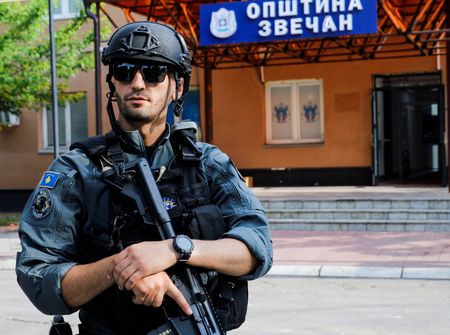 1
1 1
1
By Fatos Bytyci
ZVECAN, Kosovo (Reuters) -The United States and allies rebuked Kosovo for escalating tensions with Serbia on Friday, saying the use of force to install mayors in ethnic Serb areas undermined efforts to improve troubled relations with neighbouring Serbia.
Serbian President Aleksandar Vucic placed the army on full combat alert and ordered units to move closer to the border following clashes on Friday between Kosovan police and protesters opposed to the ethnic Albanian mayors.
Police fired tear gas in the town of Zvecan to disperse a crowd trying to prevent a newly-elected mayor from entering his office, after a vote in April was boycotted by the Kosovo Serb majority in four northern municipalities near the border with Serbia.
U.S. Secretary of State Antony Blinken criticized the government of Kosovo for accessing the municipal buildings by force and called on Prime Minister Albin Kurti to reverse course.
In a statement, Blinken said Kosovo’s actions went against U.S. and European advice and had “sharply and unnecessarily escalated tensions, undermining our efforts to help normalize relations between Kosovo and Serbia and will have consequences for our bilateral relations with Kosovo.”
Britain, France, Italy, Germany and the United States issued a joint statement that called on Kosovan authorities to step back and de-escalate the situation.
The U.S. has been Kosovo’s main supporter politically, militarily and financially since it declared independence from Serbia in 2008.
Ethnic Albanians form more than 90% of the population in Kosovo, with Serbs only the majority in the northern region.
Serbs in Kosovo’s northern region do not accept the 2008 declaration of independence from Serbia, almost a decade after the end of a war there, and still see Belgrade as their capital.
A Western-backed plan verbally agreed to by Kosovo and the Serbian government in March aimed to defuse tensions by granting local Serbs more autonomy, with the government in Pristina retaining ultimate authority.
MORE AUTONOMY
Some 50,000 Serbs living in four north Kosovo municipalities, including Zvecan, shunned the April 23 vote in protest that their demands for more autonomy had not been met.
Turnout in the April election was just 3.47% and local Serbs said they would not work with the new mayors in the four municipalities – all from ethnic Albanian parties – because they do not represent them.
In a statement, the Kosovo police said five of its officers were slightly injured when protesters pelted them with rocks and other objects. Four police vehicles were attacked, including one that was set ablaze, the statement said. Gunfire was also heard in the area, it said.
Around 10 people sought medical attention in a local hospital for light injuries and the effects of tear gas, local Serb health authorities said.
Earlier, police in the Kosovan capital of Pristina issued a statement saying they were assisting the newly-elected mayors to enter the municipal offices.
The mayor in Zvecan was successfully escorted into the municipal building, a Reuters reporter heard on a police radio.
In a speech to thousands of supporters at his Serbian Progressive Party’s rally in Belgrade, Serbia’s Vucic announced a session of the country’s national security council to discuss the situation.
“We have never had a more difficult and bigger crisis” he said, adding that while he would strive for peace, Serbia would “not sit idle” if ethnic Serbs were attacked in the north of Kosovo.
Vucic, accused the West of weakness and acting slowly.
Kosovo’s President Vjosa Osmani said police actions “against Vucic’s illegal structures and criminal gangs are legitimate, in fulfilment of their constitutional duties to defend all citizens without distinction.”
Several vehicles from the NATO peacekeeping mission in Kosovo were seen in the vicinity of the site of the incident, while helicopters flew over the area, a Reuters reporter said.
The situation was calm in the late hours. Municipality buildings were still guarded by heavily-armed police officers with their armoured vehicles blocking roads in and out of the mayors’ offices.
EU foreign affairs spokesman Peter Stano called all parties to “de-escalate the tense situation and restore calm immediately.”
“The EU will not accept any further unilateral or provocative actions and preservation of peace and security on the ground should be prioritised,” he said in a statement.
(Reporting by Reuters TV, Fatos Bytyci, Aleksandar Vasovic and Ivana Sekularac in Belgrade, Simon Lewis in Washington and Andrew Gray in Brussels; Editing by Frank Jack Daniel)